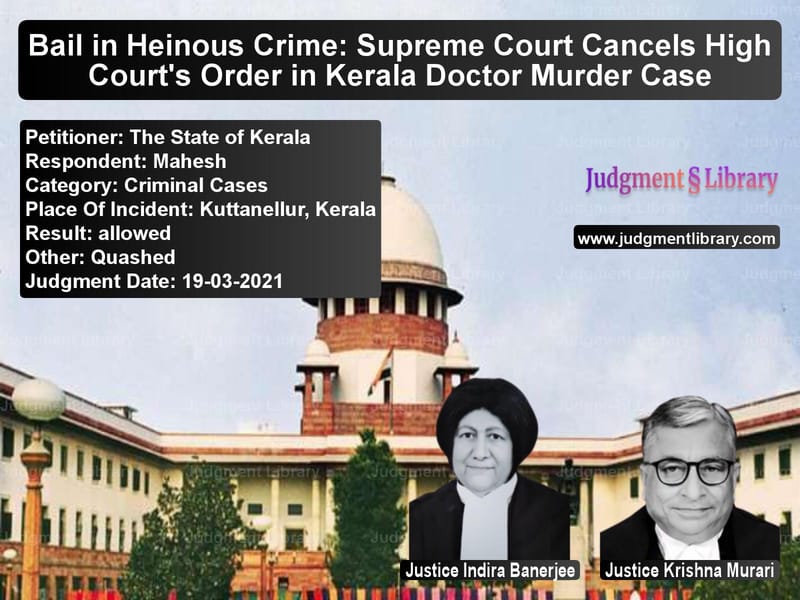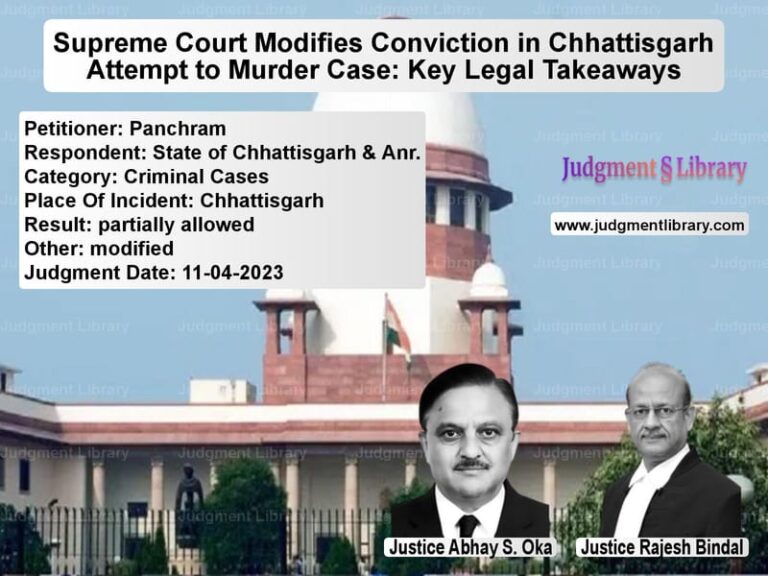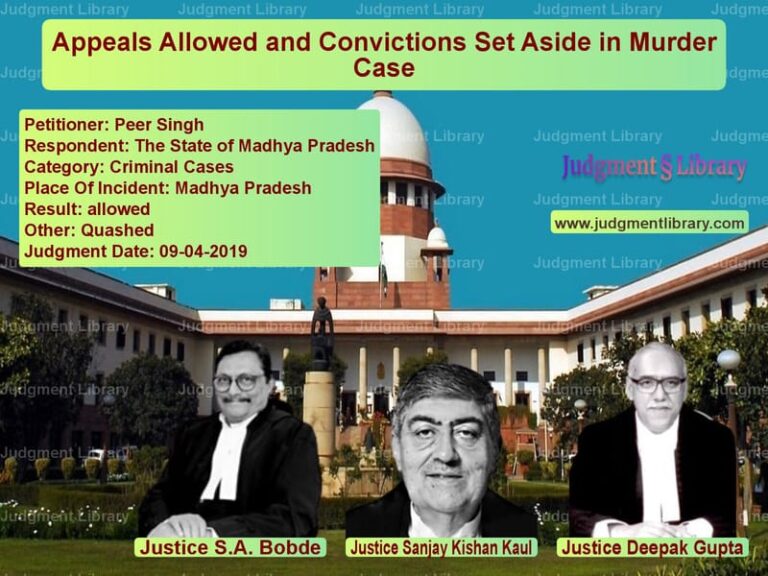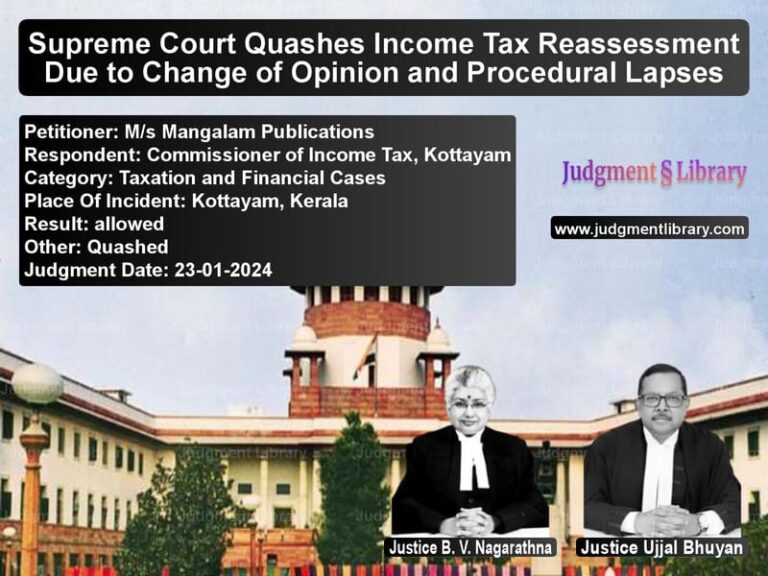Bail in Heinous Crime: Supreme Court Cancels High Court’s Order in Kerala Doctor Murder Case
The case of The State of Kerala vs. Mahesh revolves around the gruesome murder of a young woman doctor in Kerala. The Supreme Court was called upon to decide whether the High Court’s decision to grant bail to the accused was legally justifiable. The ruling set an important precedent on judicial discretion in bail matters, particularly in cases involving heinous crimes.
Background of the Case
The incident took place on September 28, 2020, when the accused, Mahesh, allegedly stabbed the victim, a 30-year-old doctor, inside her multispeciality dental clinic in Kuttanellur. The victim succumbed to her injuries on October 4, 2020, at Jubilee Mission Hospital. The prosecution alleged that Mahesh had a personal relationship with the victim, but their relationship had deteriorated due to his abusive behavior.
The victim had reportedly filed a complaint against Mahesh just two days before the attack, fearing for her safety. According to the prosecution, Mahesh misappropriated money from the victim’s clinic, physically and mentally abused her, and even forced her to undergo an abortion. The attack was said to have been premeditated, as Mahesh entered the clinic with a knife and stabbed the victim in the presence of her father.
Legal Proceedings
Following the victim’s death, the case was registered under Sections 341, 324, 201, 212, 307, and 302 of the Indian Penal Code (IPC). Mahesh was arrested on October 6, 2020, and his initial bail plea was rejected by the Sessions Court on December 9, 2020. However, the Kerala High Court granted him bail on December 21, 2020, citing prolonged custody and imposing conditions to restrict his movements.
Arguments of the Parties
Petitioner’s Arguments (State of Kerala):
- The accused committed a brutal and premeditated murder in the presence of the victim’s father, who was an eyewitness.
- The Sessions Court had provided well-reasoned grounds for denying bail, including the possibility of the accused influencing witnesses.
- The High Court failed to appreciate the seriousness of the offense and granted bail without any valid justification.
- The victim had filed a police complaint just before the attack, showing she was under threat.
The Supreme Court noted the petitioner’s argument: “The High Court neither considered nor discussed the elaborate reasons given by the Sessions Court in rejecting bail.”
Respondent’s Arguments (Mahesh):
- The accused had already been in custody for over 75 days at the time of the bail order.
- The bail conditions imposed by the High Court, including restricting his movements, were sufficient to prevent any interference with witnesses.
- The accused did not flee after the incident, and the prosecution’s case was based on circumstantial evidence.
Supreme Court’s Analysis
1. High Court’s Failure to Consider the Sessions Court’s Findings
The Supreme Court criticized the High Court for granting bail without addressing the Sessions Court’s detailed reasons for rejecting bail. It stated:
- “The High Court has neither considered nor discussed the elaborate reasons given by the Sessions Court in rejecting the bail plea.”
- “The gravity of the offense and the manner in which the crime was committed should have been given due weightage.”
2. Influence on Witnesses and Threat to Justice
The Court observed that the accused could influence witnesses, given that many were his acquaintances. The father of the victim had also filed an intervention application, fearing that the accused would threaten witnesses if released.
The Court stated:
- “Restricting the accused from entering the jurisdictional limits of the police station does not ensure that witnesses remain protected.”
- “The High Court’s reasoning that two other accused persons had not been arrested is flawed, as they were charged with a lesser offense of harboring the accused.”
3. Balancing Individual Liberty and Public Interest
While acknowledging the principle that bail is the rule and jail is the exception, the Supreme Court held that such a rule does not apply when the accused is involved in a heinous offense like murder. It reiterated:
- “In cases of heinous crimes, the nature and gravity of the accusation must be given utmost importance.”
- “Public interest and justice demand that the accused remains in custody to prevent undue influence on the trial process.”
Final Judgment
The Supreme Court set aside the High Court’s bail order and directed that Mahesh be taken into custody immediately. The key findings were:
- The High Court granted bail without properly considering the Sessions Court’s findings.
- The accused posed a serious threat to witnesses and the justice process.
- The nature of the crime and the available evidence warranted continued custody.
- The High Court’s decision was legally unsustainable and had to be overturned.
This ruling underscores the principle that while bail is a right, it cannot be granted mechanically in cases involving serious offenses. The Supreme Court’s intervention ensures that judicial discretion is exercised with due regard to public safety and the interests of justice.
Read also: https://judgmentlibrary.com/legal-battle-over-cheating-and-assault-allegations-a-case-analysis/
Petitioner Name: The State of Kerala.Respondent Name: Mahesh.Judgment By: Justice Indira Banerjee, Justice Krishna Murari.Place Of Incident: Kuttanellur, Kerala.Judgment Date: 19-03-2021.
Don’t miss out on the full details! Download the complete judgment in PDF format below and gain valuable insights instantly!
Download Judgment: the-state-of-kerala-vs-mahesh-supreme-court-of-india-judgment-dated-19-03-2021.pdf
Directly Download Judgment: Directly download this Judgment
See all petitions in Murder Cases
See all petitions in Bail and Anticipatory Bail
See all petitions in Judgment by Indira Banerjee
See all petitions in Judgment by Krishna Murari
See all petitions in allowed
See all petitions in Quashed
See all petitions in supreme court of India judgments March 2021
See all petitions in 2021 judgments
See all posts in Criminal Cases Category
See all allowed petitions in Criminal Cases Category
See all Dismissed petitions in Criminal Cases Category
See all partially allowed petitions in Criminal Cases Category







